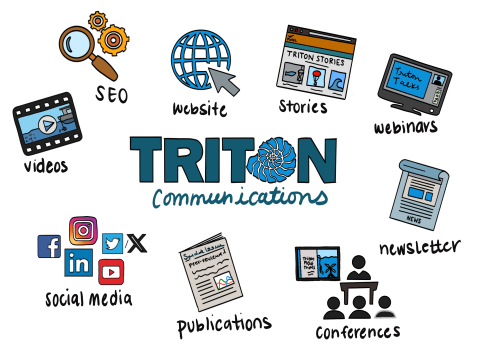
Science Communication and Outreach Research for Environmental Monitoring
End-User Engagement and Evaluation Study
Science communication is a critical step in the research life cycle, ensuring research outputs get into the hands of end users. However, the impact of communications efforts can be challenging to quantify, and empirical knowledge gaps exist regarding effective approaches. Triton is interested in understanding how end users of marine energy environmental monitoring research access and use information so we can improve the transfer of data and findings from researchers to diverse audiences.
Triton’s End-User Engagement and Evaluation (E3) study researches and evaluates the efficiency of communications outputs to key marine energy audiences. The E3 study will conduct qualitative research to understand how Triton’s end users within the regulatory community seek and process information to inform decision-making for the marine energy industry. The E3 study team will apply demonstrated social science methodologies by combining qualitative data from semi-structured interviews with end users and quantitative data from established communications engagement metrics.
This effort will provide research-based recommendations to improve Triton’s communications outputs and processes. The results will not only guide future communications practices but will also be broadly applicable to other scientific programs and projects.
Communications, Outreach & Engagement

Science communication and outreach are emerging needs emphasized as priorities for the marine energy industry. Triton’s Communications, Outreach, and Engagement (COE) team is dedicated to effectively communicating innovative science from projects to stakeholders to address these needs. Triton’s aim is to provide consistent and transparent communication for research results, data products, processes, and recommendations. The COE team works to develop and disseminate a variety of content, including our monthly newsletter, social media posts, websites, webinars, and Triton Stories. These activities enable intentional messaging around emerging and complex topics of interest for the marine energy industry including research that can inform regulatory concerns, provide support for environmental risk mitigation and application, and address topics that may be sensitive or misunderstood by some stakeholders or end users.
Want to get in touch with our team? Reach out to us at tritonmre@pnnl.gov!